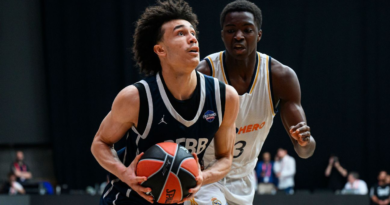Dodgers' Freeman joins 2,000-hit club with double
LOS ANGELES — Two-thousand hits hadn’t been much of a thought in Freddie Freeman‘s mind; the hallowed number, and the ultimate goal, is 3,000. But his 6-year-old son, Charlie, kept reminding him about it. The Los Angeles Dodgers‘ homestand was coming to an end, a mini slump was prolonging, and Freeman was running out of time. Finally, with two outs in the eighth inning of Sunday’s home finale, it came — a scorching double into the right-center-field gap and career hit No. 2,000, making Freeman the sixth active player to reach the milestone.
He did it in front of his father, who lives only about a 40-minute drive south, and his wife and his three kids, including Charlie — and in front of 47,000-plus people who serenaded him with two standing ovations.
“The fans have embraced my family and I since the day they got here,” Freeman said after a 6-5, 11-inning loss to the Houston Astros. “They made another special memory for the Freeman family. Dodger fans never disappoint. Another special day, one I’ll never forget. Took long enough, but I’m glad it happened at home.”
Freeman, 33, joined Miguel Cabrera, Joey Votto, Nelson Cruz, Elvis Andrus and Andrew McCutchen among active players who have accumulated at least 2,000 hits. He became the eighth player to reach that mark in a Dodgers uniform, according to research from Elias Sports Bureau, along with Adrian Gonzalez, Jeff Kent, Tim Wallach, Brett Butler, Gary Carter, Willie Davis and Maury Wills.
Freeman’s hit sparked a rally — cutting the Dodgers’ deficit to two, right before Will Smith‘s home run tied it and ultimately forced extras — and came 38 days after his 300th career home run went for a grand slam. Freeman is now the 98th player in baseball history to accrue at least 300 homers and 2,000 hits.
“That kinda hits a little bit,” Freeman said. “This game’s been going on for a long time.”
The context made Freeman think about his father, Fred, and all those rounds of batting practice, some as recently as this past offseason. It made him think about his wife and kids, and the sacrifices that come with navigating a major league schedule. And it made him think about the work — the persistent, unrelenting, monotonous work that has helped him become one of the preeminent players of this era.
It’s what resonates most with Dodgers manager Dave Roberts.
“I just marvel at his consistency, his everyday, workman-like attitude,” Roberts said. “Hasn’t been great the last week, but you know you can pencil him in there and he’s going to give you his best every single day.”
Freeman finished the month of May with the second-highest batting average in the sport, but he had struggled through most of June. Heading into Sunday, his batting average had dropped 30 points, from .346 to .316. Through the first four games this week, he managed only two hits in 14 at-bats, then was retired in his first two plate appearances Sunday, his career total sitting stagnant at 1,998. A six-time All-Star and three-time Silver Slugger who excelled at driving pitches the other way was getting a little too pull-happy for his liking.
Then came the sixth inning. Freeman stayed back long enough on a Hunter Brown changeup and lined it into the area of a vacant third base for a double, rekindling the feeling of driving through the baseball that had eluded him. It helped set up his second double — against hard-throwing reliever Rafael Montero, while hitting into the shadows — two innings later.
Freeman doffed his helmet to the crowd upon reaching second base, then later came out for a curtain call when the Dodger Stadium fans started the same “Fre-ddie!” chant that made him feel so welcomed during his first season in Los Angeles last year.
“Hits mean a lot to me,” he said. “Everyone views success differently in their careers, and how they go about it, but hits and average, that is what I care about. If I have a lot of hits, and I have a good average, that means I’m getting on base a lot for my team and we’re able to score a lot of runs.”
The target now is 3,000 — an incredibly difficult milestone to reach, particularly in such a difficult era for hitters, but not an impossible one.
In 11 prior full seasons, not counting the COVID-19-shortened season of 2020, Freeman has averaged 166 hits per year. If that rate continues, he would reach 3,000 by his age-39 season in 2029 (his contract with the Dodgers expires in 2028). Freeman has done the math.
“Father time will catch up at some point,” Freeman said, “but might as well go for the next thousand since you got to 2,000. Yeah, that would be pretty cool. Hopefully I can play long enough to be able to do that.”




